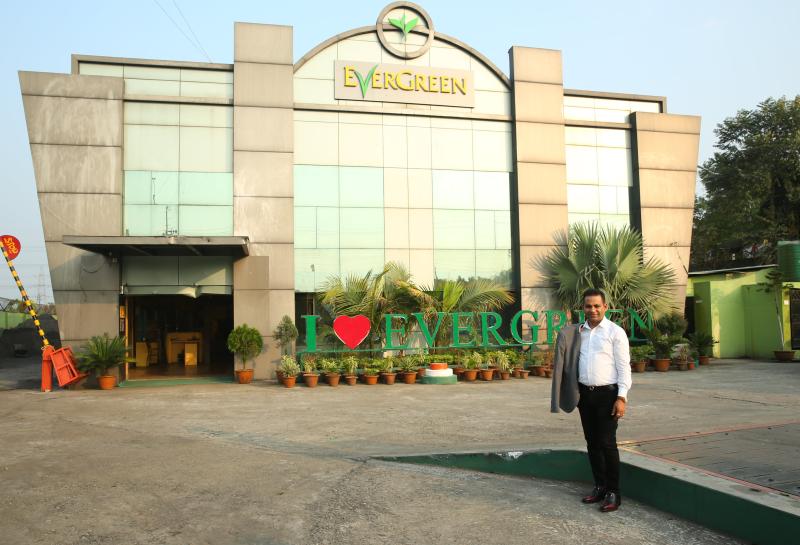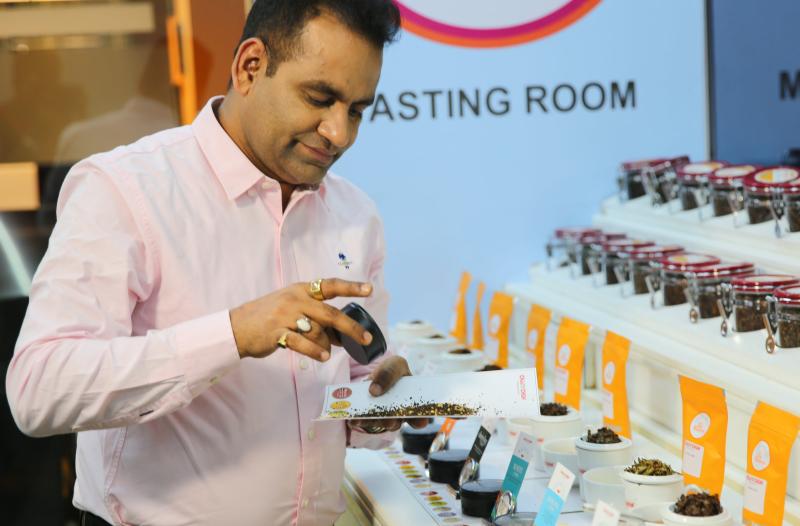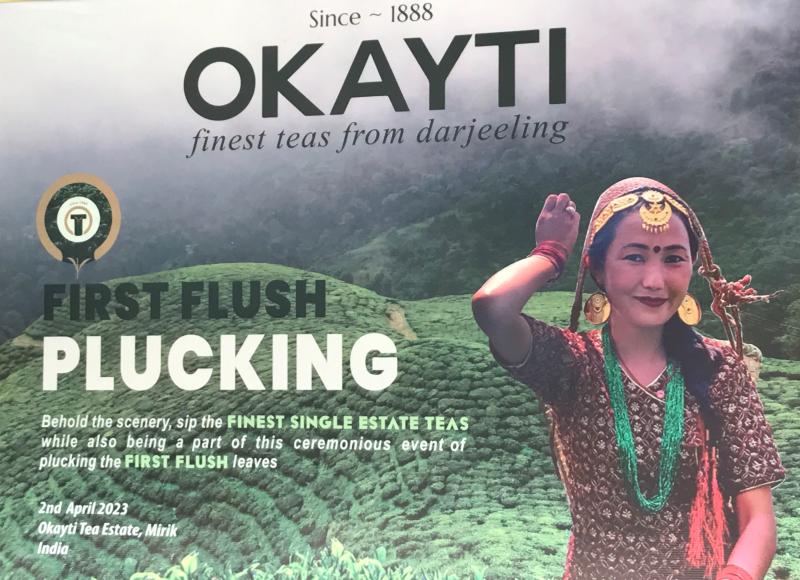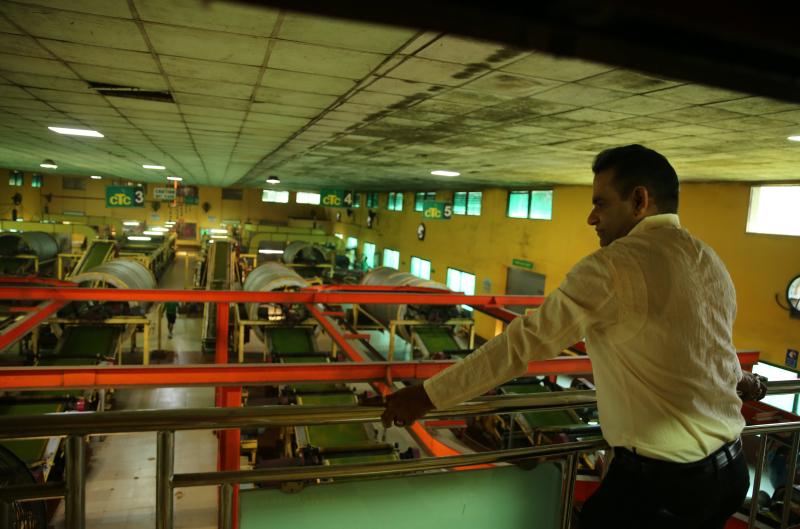More so even than porters at train stations in India, most people are blissfully oblivious to the comings and goings of the humble hawkers who hustle their meagre wares, such as a cup of tea to those who would flip them the change from their pocket. For such was the life of Rajeev Baid, one of Darjeeling’s newest tea barons, whose modest beginnings belay the wealth he has amassed and the vision he has had for burnishing it. Today, he is the owner of Darjeeling’s third oldest tea garden, namely OKAYTI, and heads a set of tea boutiques called Chai Chun while selling CTC tea to such large companies as TATA Tea Limited, Goodricke Group Limited and Hindustan Unilever.
Then as now, Baid looks to the horizon and dreams of how he can add a new dimension to his ventures while offering opportunities to the tea growers and sellers of India. This makes him a new kind of tea baron in Darjeeling, where he is in the process of rebranding his old but stately tea garden.

Finding Major Success Within the Tea Industry
Baid is not a generational scion of a planting family – nor does he have any inherited wealth. The fifth child of nine siblings with only his father to bring in the monthly income, Baid realized at age 13 that he would have to chart his own destiny or else become caught up in a life that would keep him treading water instead of trusting forward.
Having observed at Bihar’s Kishenganj railway station that the pervasive beverage that travelers imbibed on their trip was tea, he decided to try his hand at selling the commodity. Amassing as much tea from wholesalers as possible with the aim of selling tea to the small tea shops on the railway line and at bus stations, Baid was always a different kind of hawker. Bolder, more ambitious and, above all, well-liked. Rather than sell to the consumers as so many hawkers do, he decided selling to shops would be more profitable as he could move the merchandise at a more bulk level than in retail quantities.
He soon garnered a reputation as an enthusiastic and savvy salesman. It was enough to get him a job at Bihar’s first tea factory, Apex Tea Pvt. Ltd. There he built on his reputation as a top marketing agent and salesperson and worked from dawn till dusk trying to sell the tea that was manufactured at the facility. It wasn’t long before he negotiated a partnership stake in the fledgling start-up, for the owner, ultimately taking the company over when the owner desired to step away from it.
Anyone with Baid’s past could have been proud of such an achievement, the temptation to rest on one’s laurels and enjoy life being high – but Baid did not rest there. He leveraged his position to open the first ever tea factory in Siliguri West Bengal, which he named Evergreen.
The factory produced CTC tea, which he sold to wholesale customers through contacts made at Apex Tea Pvt., ultimately landing some very big fish in the process such as Tata Tea, Hindustan Unilever and Goodricke Tea Company, among others. Ramping up to a total capacity of fifty million tonnes of tea per year, Baid made a second fortune that dwarfed his first.

A New Focus on the Premium Tea Market and Darjeeling Harvests
As astounding as his success turned out to be, Baid was still not satisfied. He longed to connect the producers to the consumers of tea sans the middleman (India’s tea industry is rife with layers of middlemen who lower quality by adulteration and increase the price of tea). This time, he did not want to limit himself to CTC tea; Baid wanted to enter the premium tea market led by Darjeeling harvests.
Driven by a profound passion for tea, he possessed a keen understanding that tea from various gardens exhibited unique and distinct tastes, and so he endeavored to bring these tastes to the consumer. This inspired him to establish Chai Chun, a venture dedicated to offering a diverse selection of teas from different gardens, all conveniently available under one roof. Although he had a background in the tea manufacturing business, his focus from in Chai Chun was on the retail segment.
Chai Chun, or “tea selection,” sources its tea from various premium gardens. Indeed, Baid was careful in his blending of the teas, using experts to develop a high cup consistency. The most premium teas were left then with their original single estate labels on the packaging, so his customers could have the opportunity to try single estate teas in their original forms. While Darjeeling headlines the premium fold, Chai Chun offers teas from Assam, Nilgiri, Sikkim and other states. Baid also branched out into flavored teas and seasonal teas to cater to the demands of a changing younger demographic that’s not as enthralled by orthodox Darjeeling as the previous generation.
The Chai Chun stores also have an extensive line of tea ware and, in particular, a two-mug tea pot that requires no strainer, which simply drains into the cup from the bottom of the receptacle, is a popular seller.
It wasn’t long before Chai Chun was a hit, accumulating in expansion to a dominion of twenty-two outlets across India.

Seeing the Market Potential of Darjeeling Orthodox Tea
Having flourished in retail and CTC manufacturing, Baid could not help but continue dreaming. In fact, the pinnacle of excellence in Indian tea is Darjeeling, but Baid had yet to foray into this sphere. So, when the historic OKAYTI estate came up for sale in 2021, he jumped at the chance to buy the historic garden, recognizing Darjeeling orthodox tea's market potential.
Located in Mirik Valley, 45 kilometres from Darjeeling town, Okayti Tea Estate is adorned with beautiful slopes, subtropical climate and the right kind of soil. It has been producing tea of excellent quality since its inception and it still stands as a proud producer of the world’s finest tea.
The tea bushes are planted in approximately 208 hectares out of 647 hectares that make up the estate. Nestled in the scenic landscape in the Himalayas, it is one of the highest elevation tea estates of Darjeeling.
While the environment and location of the estate plays a significant part in the development of the flavors and aroma of a tea. It’s abundance of original Darjeeling tea plant known as China Bush – this too planted at such high elevation – make OKAYTI’s offerings unique in the area.
Fully organic and biodynamic, the garden offered Baid a chance unlike anything he’d previously experienced: The opportunity to own a prestige garden in one of the most bountiful habitats in the tea industry, making Baid – at long last – a tea baron in his own right.

Typical for Baid, he is currently looking to reinvent the venerable garden within the tea marketplace. Previously known as Rangdoo, OKAYTI derives its name from being known as the only “okay tea” for the Royal family of the United Kingdom. Among its connoisseurs were the late monarch, Queen Elizabeth, and India’s first Prime Minister, Jawaharlal Nehru.
Baid plans to penetrate the elitism of the brand and bring OKAYTI to the average consumer. He also aims to elevate Darjeeling tea within the international market (branding for which has been waning over the past 10 years or so), while creating employment opportunities for the local community. His vision also includes the promotion of tea tourism to showcase the beauty and heritage of Darjeeling, hoping to attract visitors to experience the tea culture firsthand. Baid’s rebranding of OKAYTI, he hopes, will give Darjeeling tea a distinct and remarkable identity across the globe.
‘Embrace Passion and Commitment, Prioritize Quality’
What advice does Baid have for tea sellers who are aspiring to become tea barons?
“Embrace passion and commitment, prioritize quality, build a strong brand, explore diverse markets, prioritize customer satisfaction, and give back to the community and environment,” he said. Of course, these are all elements of Baid’s success. One might add “never being satisfied” and “always looking to the horizon” or dreaming about the next big idea.

SB Veda is the pen name for Sujoy Bhattacharyya, who is a British/Canadian writer based in Kolkata. Born in London and raised in the U.K. and Canada, the award-winning writer and editor’s works have also been published in The Independent, The Guardian, the Ottawa Citizen, The Global Calcuttan and Pragati International. He has a longstanding connection to Darjeeling, where he tries to visit once a year, and he’s currently working on a book about a Darjeeling tea garden, which is expected release in 2023.
Don’t Miss the Weekly World Tea News eNewsletter! Get your free subscription, if you’re not already subscribed, by clicking here.
Plan to Attend or Participate in World Tea Expo, March 18-20, 2024
To learn about other key developments, trends, issues, hot topics and products within the global tea community, plan to attend World Tea Expo, March 18-20, 2024 in Las Vegas, co-located with Bar & Restaurant Expo. Visit WorldTeaExpo.com.
To book your sponsorship or exhibit space at the World Tea Conference + Expo, or to enquire about advertising and sponsorship opportunities at World Tea News, contact:
Ellainy Karaboitis-Christopoulos
Business Development Manager, Questex
Phone: +1-212-895-8493
Email: [email protected]
Also, be sure to stay connected with World Tea Expo on social media for details and insights about the event. Follow us on Twitter, Facebook, Instagram and LinkedIn.
